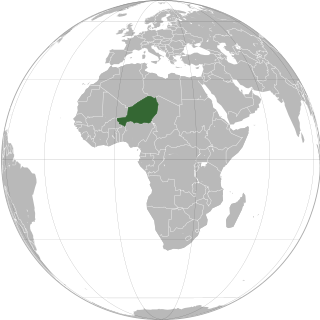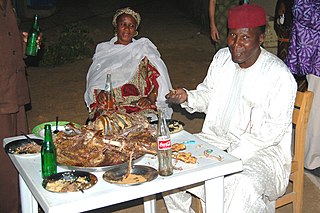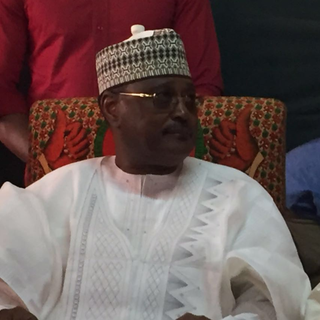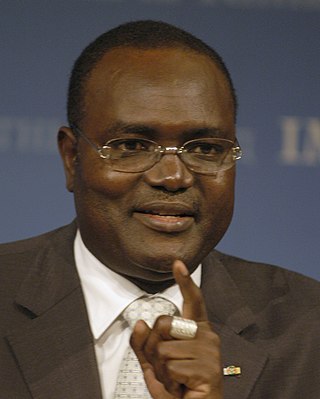Related Research Articles

Niger or the Niger, officially the Republic of the Niger, is a landlocked country in West Africa. It is a unitary state bordered by Libya to the northeast, Chad to the east, Nigeria to the south, Benin and Burkina Faso to the southwest, Mali to the west, and Algeria to the northwest. It covers a land area of almost 1,270,000 km2 (490,000 sq mi), making it the largest landlocked country in West Africa. Over 80% of its land area lies in the Sahara. Its predominantly Muslim population of about 25 million live mostly in clusters in the further south and west of the country. The capital Niamey is located in Niger's southwest corner.

Islam in France is a minority faith. Muslims are estimated to represent around 4 to 8 percent of the nation's population and France is estimated to have the largest number of Muslims in the Western world, primarily due to migration from Maghrebi, West African, and Middle Eastern countries. After conquering much of the Iberian peninsula, the Umayyad Muslim forces invaded modern day southern France, but were decisively defeated by the Frankish Christian army led by Charles Martel at the Battle of Tours in 732 AD, thus preventing the subsequent Islamisation of the Western Europe.

Ahmadou Bamba Mbacke also known to followers as Khādimu 'al-Rasūl or "The Servant of the Messenger" and Serigne Touba or "Sheikh of Tuubaa", was a Sufi saint (Wali) and religious leader in Senegal and the founder of the large Mouride Brotherhood.

Islam is the most practiced religion in Turkey. The established presence of Islam in the region that now constitutes modern Turkey dates back to the later half of the 11th century, when the Seljuks started expanding into eastern Anatolia.

Islam is very important to traditional Malian culture. Muslims currently make up approximately 95 percent of the population of Mali. The majority of Muslims in Mali are Malikite Sunni, influenced with Sufism. Ahmadiyya and Shia branches are also present.
The French Council of the Muslim Faith, is a national elected body, to serve as an official interlocutor with the French state in the regulation of Muslim religious activities. It is a non-profit group created on 28 May 2003 by Nicolas Sarkozy and a group of Islamic students who felt they needed better representation in their country. The council consists of 25 CRCMs. From 2008 to 2013 the president of the CFCM was Mohammed Moussaoui, a CIO of SFR French telecommunications company representing the Rassemblement des musulmans de France.
Musulmans de France, formerly Union des organisations islamiques de France is a prominent Muslim umbrella organization, and the French chapter of the Federation of Islamic Organizations in Europe. Its inclusion by then Interior Minister Nicolas Sarkozy into the Conseil Français du Culte Musulman has been criticized by both left-wing and right-wing members.

Islam is the predominant religion in Senegal. 97 percent of the country's population is estimated to be Muslim. Islam has had a presence in Senegal since the 11th century. Sufi brotherhoods expanded with French colonization, as people turned to religious authority rather than the colonial administration. The main Sufi orders are the Tijaniyyah, the Muridiyyah or Mourides, and to a lesser extent, the pan-Islamic Qadiriyyah and the smaller Layene order. Approximately 1% are Shiites and <1% are Ahmadiyya Muslims.

Islam in Djibouti has a long history, first appearing in the Horn of Africa during the lifetime of Muhammad. Today, 98% of Djibouti's 490,000 inhabitants are Muslims. According to Pew, 77% follow the denomination of Sunnism, whilst 8% are non-denominational Muslim, and the remaining 13% follow other sects such as Quranism, Shia, Ibadism etc.. After independence, the nascent republic constructed a legal system based in part on Islamic law.
Amadou Cheiffou is a Nigerien politician who was Prime Minister of Niger from 26 October 1991 to 17 April 1993, heading a transitional government. He has led the Social Democratic Rally (RSD-Gaskiya), a political party, since founding it in January 2004. Cheiffou was President of the Economic, Social and Cultural Council of Niger (CESOC) from January 2006 to February 2010, and he held the official post of Ombudsman from August 2011 to December 2015.

Islam in Niger accounts for the vast majority of the nation's religious adherents. The faith is practiced by more than 99.3% of the population, although this figure varies by source and percentage of the population who are classified as Animist. The vast majority of Muslims in Niger are Malikite Sunni with Salafi influences. Many of the communities who continue to practice elements of traditional religions do so within a framework of syncretic Islamic belief, making agreed statistics difficult. Islam in Niger, although dating back more than a millennium, gained dominance over traditional religions only in the 19th and early 20th centuries, and has been marked by influences from neighboring societies. Sufi brotherhoods have become the dominant Muslim organization, like much of West Africa. Despite this, a variety of interpretations of Islam coexist—largely in peace—with one another as well as with minorities of other faiths. The government of Niger is secular in law while recognising the importance of Islam to the vast majority of its citizens.

The government and people of Niger observe twelve official public holidays. These include international commemorations, the commemoration of important dates in the history of Niger, and religious holidays. Both Christian and Muslim holidays are observed as official public holidays. While the former colonial power, France, instituted Christian observances, the vast majority of Nigeriens are Muslim.

Mohamed Bazoum, is a Nigerien politician who is the current president of the Republic of Niger. He has been in office since 2 April 2021.

Seyni Oumarou is a Nigerien politician who was Prime Minister of Niger from June 2007 to September 2009 and President of the National Assembly of Niger from November 2009 to February 2010. He is from the west of the country and is a member of the Djerma ethnic group. Since November 2008, he has been the President of the National Movement for the Development of Society (MNSD). He unsuccessfully stood as a presidential candidate in 2011, 2016 and 2021. After years as an opposition leader under President Mahamadou Issoufou, he was appointed to the post of High Representative of the President in October 2016.

According to the Republic of Niger's Constitution of 1999, most human rights, as defined by the Universal Declaration of Human Rights, are upheld and protected. Despite these protections, concerns of both domestic and international human rights organizations have been raised over the behavior of the government, military, police forces, and over the continuation of traditional practices which contravene the 1999 constitution. Under French colonial rule (1900–1960) and from independence until 1992, citizens of Niger had few political rights, and lived under arbitrary government power. Although the situation has improved since the return to civilian rule, criticisms remain over the state of human rights in the country.
The Constitution of Chad provides for freedom of religion; however, at times, the Government limited this right for certain groups. There are seldom reports of societal abuses or discrimination based on religious belief or practice. The different religious communities generally coexisted without problems, although some tensions between different Muslim groups and between Muslims and Christians were reported.
Mass media in Niger is a diverse collection of public and private entities, both print and broadcast, centered in the capital of Niamey, but with vibrant regional centers. The media has historically been state funded, and focused on radio broadcast media, as the nation's population is spread over great distances. Niamey boasts scores of newspapers and magazines, many of which are fiercely critical of the government. These papers though have very small circulations, and almost none outside the cities.

Ali Badjo Gamatié is a Nigerien politician and civil servant who served as Prime Minister of Niger from October 2009 to February 2010. He was Minister of Finance from 2000 to 2002 and then served as Vice-Governor of the Central Bank of West African States (BCEAO) before being appointed as Prime Minister by President Mamadou Tandja. Gamatié was Prime Minister for only a few months, however, as Tandja was overthrown in a February 2010 military coup.
Issa Lamine is a Nigerien politician. He led the Toubou-based Front Democratique Revolutionnaire, one of several rebel groups operating in the far north and east of Niger in the late 1990s. Lamine entered government as a representative of the eastern town of N'Gourti in 2000. As a member of the Democratic and Social Convention (CDS-Rahama), he was a Deputy in the National Assembly of Niger and then served in the government of Niger as Minister of Public Health from 2007 to 2009. He left the CDS-Rahama in 2009 and was elected to the National Assembly as an independent candidate.
The status of religious freedom in Africa varies from country to country. States can differ based on whether or not they guarantee equal treatment under law for followers of different religions, whether they establish a state religion, the extent to which religious organizations operating within the country are policed, and the extent to which religious law is used as a basis for the country's legal code.
References
- ↑ Mahaman Alio. L’Islam et la femme dans l’espace public nigérien. Conference Paper. "Governing the African Public Sphere". CODESRA 12th General Assembly. 07-11/12/2008, Yaoundé, Cameroun.
- 1 2 Niger:International Religious Freedom Report 2006. Bureau of Democracy, Human Rights, and Labor. United States Department of State (2007) As a United States Federal government document, this report is in the Public Domain. Portions are used here verbatim.
- ↑ Pearl T. Robinson. ISLAM AND FEMALE EMPOWERMENT AMONG THETIJANIYYA IN NIGER Archived 2009-07-16 at the Wayback Machine . Research Note: September 2005. Tufts University.
- ↑ United States Department of State, 2008 Report on International Religious Freedom - Niger, 19 September 2008.
- ↑ Niger/Référendum - Appel au dialogue des chefs religieux. Reuters, Abdoulaye Massalatchi. 7 June 2009
- Moulaye HASSANE, Marthe DOKA, & Oumarou MAKAMA BAWA. ETUDE SUR LES PRATIQUES DE L’ISLAM AU NIGER. Republique du Niger. Ministere de l’Interieur et de la Decentralisation/Bureau de Cooperation Danoise - Niger. Direction Generale des Affaires Politiques et Juridiques, Direction des Affaires Coutumieres et Religieuses. (April 2006).
- Abdoul Rahamane Amadou Toudjani, Secrétaire permanent du Conseil Islamique du Niger (CIN), (Interview with Abdoul Rahamane Amadou Toudjani, Permanent Secretary of the CIN). Zabeirou Moussa. Le Sahel. 6 March 2009.